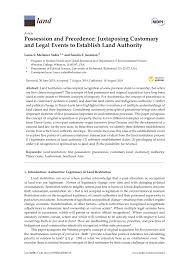Resource information
Land restitution carries implicit recognition of some previous claim to ownership, but when are first claims recognized? The concepts of first possession and original acquisition have long been used as entry points to Western concepts of property. For Austronesia, the concept of precedence is used in customary systems to justify and describe land claims and Indigenous authority. Conflict and political change in Timor-Leste have highlighted the co-existence of multiple understandings of land claims and their legitimacy. Considering customary principles of precedence brings into relief important elements of first possession important in land restitution processes. This paper juxtaposes the concept of original acquisition in property theory to two different examples of original claims from Timor-Leste: a two-part customary origin narrative from Oecusse and the development of a national land law for the new state. In these three narratives, we identify three different establishment events from which land authority develops. The article then uses this idea of the establishment event to explore five points of customary-statutory intersection evident from the land restitution process: (1) legitimate sources of land authority; (2) arbitrary establishment dates; (3) privileging of social order; (4) recognition of spiritual ties to land; and (5) the possibility for reversal.


